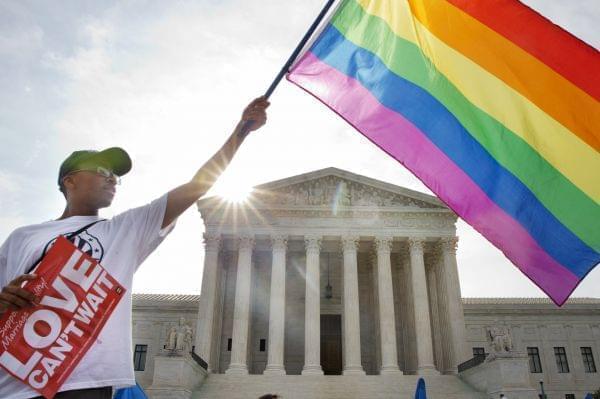Supreme Court Rules All States Must Allow Same-Sex Marriages

Carlos McKnight of Washington, waves a flag in support of gay marriage outside of the Supreme Court in Washington Friday. (AP Photo/Jacquelyn Martin)
States cannot keep same-sex couples from marrying and must recognize their unions, the Supreme Court says in a ruling that for months has been the focus of speculation. The ruling was made by a 5-4 decision.
The justices ruled in Obergefell v. Hodges, which is linked to three other cases. Together, they involve a dozen couples who challenged same-sex marriage bans in Ohio, Michigan, Kentucky and Tennessee – the only states whose bans on marriage between gay and lesbian couples have been sustained by a federal appeals court.
The justices had been asked to decide whether the Fourteenth Amendment requires states to a) license same-sex marriages and b) recognize such unions that were made in other states.
The Fourteenth Amendment, we'll remind you, was ratified shortly after the Civil War. It has to do with U.S. citizenship – and with providing equal protection for all citizens.
Before Friday's ruling, gay marriage had already been made legal in 37 states – by either legislative or voter action or by federal courts that overturned state' bans.
As NPR's Nina Totenberg reported when the Supreme Court heard the current case back in April, conservative justices had pointed questions for the attorneys:
"Justice Scalia asked whether ministers would be able to refuse to marry two gay men. The answer was that it has to be worked out under state laws. He said, but that could happen — it could happen that a minister would be forced to marry two gay men, in violation of his beliefs.
"Justice Alito asked, well then why not marry four gay men together? Why just two?"
Illinois U.S. Sen. Dick Durbin and Chicago Mayor Rahm Emanuel are among public officials applauding the U.S. Supreme Court's decision giving same-sex couples the right to marry anywhere in the nation.
In a statement, Emanuel called Friday's decision a "victory for America's true values of treating everyone equally under the law.'' Durbin called it "another step in the march toward equal rights.''
Cook County Clerk David Orr said in a statement that the decision was long overdue.
Illinois lawmakers approved gay marriage in 2013, and it was enacted in June of last year. Since then, Orr says more than 7,500 marriage licenses have been issued to same-sex couples. More than a quarter of those were for couples who came from out of state to get married.
Supporters of same-sex marriage in Indiana say the state still needs to do more to protect the rights of its gay residents.
Freedom Indiana campaign manager Katie Blair says the ruling is a victory but that Indiana still needs statewide protections against discrimination so lesbian, gay, bisexual and transgender residents aren't fired or denied housing or services because of their sexual orientation.
The grassroots group that fought Indiana's gay-marriage ban planned a noon rally at the Statehouse.
Indiana Senate Minority Leader Tim Lanane called the ruling a "momentous victory'' on the journey toward equality but echoed the call for statewide civil rights protections.
The ruling announced Friday adds new definition to an issue that has remained controversial even as an increasing number of Americans say they support equal marriage rights for same-sex couples. A recent Gallup poll found that 60 percent of Americans – an all-time high – support extending the same rights and privileges to same-sex marriages as traditional ones.
That figure included "37 percent of Republicans, 64 percent of independents, and 76 percent of Democrats," as we reported last month. And it included all age groups except for one: those 65 and over.
For supporters of same-sex marriage, today's ruling comes as a long-awaited bookend to the Supreme Court's 2013 ruling that struck down the federal Defense of Marriage Act and required the U.S. government to provide the same benefits to both gay and heterosexual couples.
Links
- Same-Sex Marriage In Front of the Supreme Court
- Same-Sex Weddings Begin In Florida After Judge Clears The Way
- Same-Sex Marriage Now Legal In Indiana
- Group: 5,000 Same-Sex Marriages In Illinois
- Advocates Go After Rauner On Same-Sex Marriage
- Ohio Ordered To Recognize Same-Sex Marriages
- US Recognizes Michigan Same-Sex Couple Marriages
- Champaign County Now Issuing Same-Sex Marriage Licenses
- Same-Sex Couples Can Now Marry In Cook County
- Same-Sex Couples Research Marriage Law In Champaign
- Attorney: Same-Sex Divorce Raises Questions
- Appeals Court Rules Against Gay Marriage Bans In Indiana, Wisconsin
- Nina Totenberg On The Upcoming Supreme Court Verdicts: What’s At Stake?

